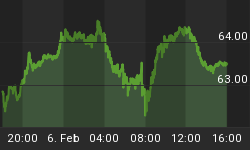It's amazing how quickly China went from being the world's savior to its biggest danger. To recap:
When the developed world stepped off a cliff in 2008, China responded by borrowing about $15 trillion and spending most of it on infrastructure. Roads, bridges, skyscrapers, power plants, whole cities went up around the country. The resulting demand for everything from iron ore to wind turbines helped offset contractions in the US and Europe, turning an incipient global Depression into nothing more than a severe recession.
But government-directed growth on this scale produces a mountain of misallocated capital which eventually comes back to haunt its owner. Lately, Chinese manufacturing has begun to contract:
China Output Contracts at Quickest Pace in 18 Months
The HSBC Flash China Manufacturing PMI shows Output Contracts at Quickest Pace in 18 Months. The overall PMI index, new orders, and production were all lower.Key points
- Flash China Manufacturing PMI™ at 48.1 in March (48.5 in February). Eight-month low.
- Flash China Manufacturing Output Index at 47.3 in March (48.8 in February). Eighteen-month low.
Commenting on the Flash China Manufacturing PMI survey, Hongbin Qu, Chief Economist, China & Co - Head of Asian Economic Research at HSBC said: "The HSBC Flash China Manufacturing PMI reading for March suggests that China's growth momentum continued to slow down. Weakness is broadly-based with domestic demand softening further.
And mass defaults are looming:
China credit strains rise as Beijing embraces failure
(Reuters) - Credit warning signs are flashing for heavily indebted Chinese semiconductor, software and commodities firms as the government cautiously steps aside to let market forces play a bigger role in deciding winners and losers.China's first-ever domestic bond default this month - a missed interest payment from Shanghai Chaori Solar Energy Science and Technology Co (002506.SZ) - shattered the belief that Beijing would always bail out struggling companies.
"The Chaori default goes to show the government will begin to let the market decide the fate of weak borrowers," said Standard & Poor's analyst Christopher Lee in Hong Kong.
Lee said defaults would be "incremental but controlled" with sectors including shipbuilding, metals and mining, and materials among those showing the highest risk as China's economic growth slows and banks tighten lending.
A Reuters analysis of more than 2,600 Chinese companies found credit metrics worsening across a range of industries. The software sector was shouldering the heaviest credit burden with an average of 3.4 times more debt than equity. Semiconductors - a category which includes solar companies such as Chaori - had a debt-to-equity ratio of 2.6.
Materials companies look vulnerable as weak commodity prices hurt profitability, leaving less money to repay debt. Although the metals and mining sector's average debt-to-equity ratio is a manageable 1.4, bond holders see rising risk and have demanded higher yields for holding the debt.
Other credit problems may be lurking in harder-to-read areas such as bank loans. News last week that a Chinese property developer owing 3.5 billion yuan was at the edge of insolvency highlighted that risk. About a third of Zhejiang Xingrun Real Estate Co's borrowings came from individual investors.
Suddenly, China looks a lot like the US circa 2007, with weaker companies on the periphery threatening to infect too-big-to-fail entities at the core. How will it respond? Almost certainly with the same tools that the US, Europe and Japan have employed: bail-outs, monetary ease, currency devaluation and bigger government deficits. In other words, a major currency war offensive. This is already happening:
Yuan's Decline Raises Concerns Over Currency War
BEIJING--The recent sharp decline in the Chinese currency is threatening to exacerbate China's trade tensions with the U.S. and raising concerns over a potential currency war in Asia.
China's central bank has intervened since late February to drive down the value of the yuan against the U.S. dollar by 2.8% so far in 2014, almost erasing all of its gains last year and ushering in a rare period of weakness for a currency which has steadily appreciated over the past decade.
The People's Bank of China argues the depreciation is needed to drive out speculators who were betting the yuan would continue to rise, according to people with direct knowledge of the central bank's thinking.
Bank officials also contend China's move to allow market forces to play a greater role in setting the yuan's value has exacerbated the weakness, according to these people.
On March 17, the central bank doubled the range in which the yuan is permitted to trade--part of efforts to liberalize the financial system. Market participants, worried over recent signs of slowing economic growth, have taken this as a cue to sell yuan, Chinese officials say.
A weakening yuan is huge deal for China's trading partners. Already, Japan has seen the yen, which it had been aggressively devaluing, rise strongly, thus threatening to derail its "Abenomics" pledge to generate at least 2% inflation. The euro is at levels that threaten to push much of the eurozone periphery back into recession. And a rising dollar/yuan will make the Fed's attempt to scale back its debt monetization an even lower-percentage bet. In other words, every time a country tries to devalue against the currencies of its trading partners, the latter have no choice but to respond in kind, which cancels the benefits of the previous devaluation.
The solution? In his new book Jim Rickards asserts that a global devaluation against gold will be the only way to generate universal inflation. So rather than trying to depress gold, public policy will soon shift to a sudden, dramatic revaluation to between $5,000 and $10,000 an ounce.
















